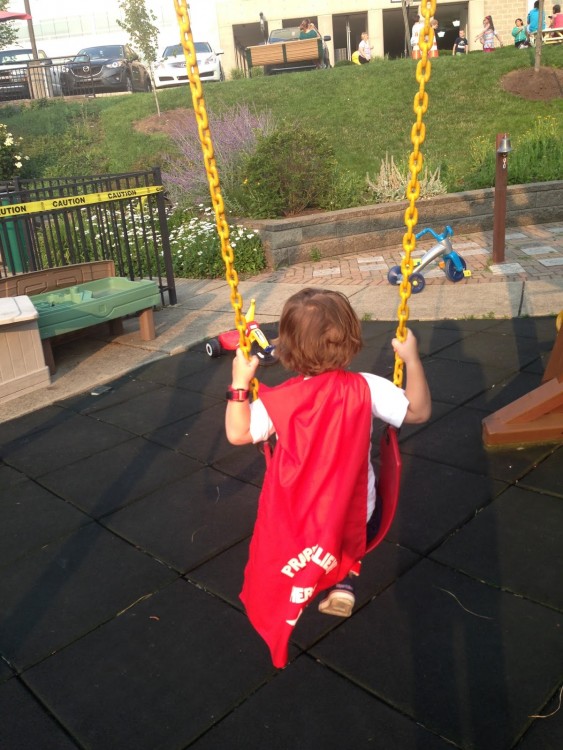“Take him home and try to give him as normal of a life as possible.”
What is normal? For one extremely, amazing four-year old little boy named Cohen, normal, means absolutely nothing can enter his body to nourish him. He survives solely on nutritional life support. It means being hospitalized for low grade fevers, extremely aggressive medications to combat infections, and being confined to an IV pole everyday. Normal, means his time outdoors is limited, no swimming, or rough little boy games. It means, leaving the house with a heavy backpack which contains a large volume of infusing fluids. This is Cohen’s reality and he deserves a better normal.
This brave little boy’s entire life has been full of invasive procedures and hospitalizations. All attempts to feed and medicate him through his digestive system have failed, ending with violent vomiting and internal bleeding. His body can only tolerate ice chips, which must be vented back out of his stomach through a gastric tube. Due to lack of motility, even small amounts of water can cause hours of painful episodes where he screams, begging for help. An extremely large colon and intestines are another source of his stomach aches, requiring continuous venting of air pressure from his belly to reduce discomfort.
Two years ago, Cohen’s growth and development reached a critical point and his doctor placed a central line (permanent IV) in his chest. It is through this line that Cohen receives TPN (total parental nutrition). His daily caloric intake is measured through blood draws which ensure all of his nutritional needs are being met. This medical nutrition is administered through 24 hour infusion, seven days a week. Without this life sustaining medication, Cohen could not survive.
Cohen’s body is in a constant state of inflammation and any illness can send his immune system into extreme overdrive, shutting down organs in its path. Cohen recently had emergency surgery to remove his severally inflamed gallbladder which was dangerously near perforating. In 2016, he went into acute liver failure from an infection that progressed quickly, wreaking havoc on his little body. Therefore, even low grade fevers must be met with aggressive medications to prevent extreme inflammatory responses and sepsis. Since he becomes ill so quickly he must be transported by air. Cohen's medical team is six hours from our home and it would be to dangerous to drive that distance during an acute situation.
Severe food/medicine allergies and intestinal failure are just a facet of Cohen’s illness. His list of symptoms and diagnosis cross over into every system in his body. Genetic sequencing revealed two additional diseases, Familial Mediterranean Fever (FMF) and Factor V Deficiency (bleeding disorder). However, Cohen's physicians do not believe these diseases are his main illness. He has also been diagnosed with dysautonomia, which is an umbrella term used to describe a lack of communication in the autonomic nervous system. For Cohen, this means he has fatigue and issues with temperature regulation, making it challenging for him to be outside. It means he screams in pain when touching snow or sweats profusely in warm temperatures. Other evasive health issues include; antibodies in his platelets, pancytopenia (all blood systems low, making blood transfusions and iron infusions necessary), hands and feet turning blue, chronic pancreatitis, as well as malacia in his upper and lower airway and nodules on his throat and vocal cords.
Normal for Cohen means heartfelt conversations with amazing doctors which begin with, “I know you’re going to ask me some really tough questions that I am not going to have the answers for, and I am going to feel awful about it.” It’s hearing the words, “Everything we try for him is experimental at this point.” Normal, is not having a plan for lack of a diagnosis.
Our team of care givers includes gastroenterology, hematology, pulmonology, immunology, ENT and rheumatology. Although, this is an amazing team of physicians, at one of the top children’s hospitals in the world, they don’t have a name for Cohen’s illness. His care is coordinated between all of these services and their resources, but they are limited by the boundaries of modern medicine.
Without a diagnosis, we have no prognosis or plan of care. Our best hope is to keep him as well as possible. For now we simply pray that the extreme measures used to nourish him, do not eventually destroy the same organs they are currently keeping alive.
Physicians have no more medical intervention to offer him. No more treatments. No better plan. We find ourselves with an unclear picture of Cohen’s future. Currently, our entire care team agrees that Cohen’s illness has yet to be identified by science.
What does all of this mean for Cohen? We wait, hoping and praying that the science of tomorrow will arrive today.
When Cohen’s disease finally gets a name we will have hope for a better treatment plan and the possibility of a cure. For now we simply pray that our story connects with individuals who hold the possibility for answers. Unfortunately, until that day arrives he will continue to be a member of the undiagnosed world and remain on a journey for a diagnosis.
“Take him home and try to give him as normal of a life as possible.” The ugly truth is although we are frustrated and hurt, we know these words come from well-intended and equally frustrated physicians, not because they want to deliver this kind of news, but because they have no more options at this point.
This is Cohen’s normal. My question is, “How can we make it better?”
















